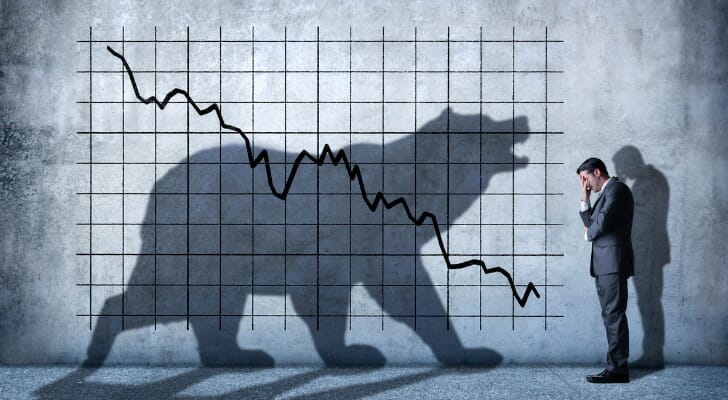Cash serves a valuable purpose in many investment portfolios, but when the stock market dives, many investors turn to cash in a knee-jerk reaction to avoid losses. However, depending on the reason, moving all your investments from equities to cash may turn out to be a significant mistake. Even during a bear market, holding a cash-heavy portfolio may lose you more money than you realize. Instead, consider cash uses and allocate only a portion of your funds to this asset class.
A financial advisor could help you rebalance your portfolio and select investments that align with your financial goals. Find a qualified advisor today.
Three Reasons Why Cash Could Be a Losing Proposition
In a situation where high inflation and increasing interest rates are the new norm, the value of your dollar decreases every day. That loss of purchasing power can add up significantly over time, and by not investing in defensive stocks or high-yield bonds, investors lose out on the opportunity to earn interest.
According to investment firm Charles Schwab, a standard 3% rate of inflation would erode $100,000 in real purchasing power by 14% over five years. Over 10 years that purchasing power would fall 26% and over 20 years, $100,000 held in cash would only equal the power of $55,368. In this case, a portfolio consisting entirely of cash still loses value over time, even though the dollar amount appears to stay constant.
Further undercutting an investor’s earning potential are the current low interest rates for short-term investments. If an investor moves all funds into a regular savings account or a money market fund, going for cash and short-term bonds, the incoming higher bond yields will suppress the value of those less-volatile investments. Even then, short-term bonds often return more than just holding cash.
As a result of market tumult, some investors may decide that pulling funds from riskier, growth assets and putting it all into cash can safeguard their money. But in doing so, these investors are surrendering potential opportunities for capital appreciation.
How Much Cash Should You Hold Then?

Even in its most conservative model portfolio, Charles Schwab only allocates 30% to cash investments. The remainder goes to 50% fixed-income securities and 20% still in stocks.
In the 2021 World Wealth Report, Capgemini reports that the world’s high-net-worth individuals allocated between 21-28% of their assets to cash in crisis years during the past two decades. 20-30% was allocated to fixed income, with another 20-30% held in stocks. If or when the economy heats up again, these cash reserves will help investors buy cheap homes, stocks and other assets.
Famed billionaire investor Warren Buffett also believes that cash is vital for emergencies, and his company Berkshire Hathaway holds $144 billion in cash or cash equivalents even now. In his annual letter to shareholders, Buffett noted that he “always keeps 80% of his assets in equities,” and at the moment, he and his partner have not found any “exciting” deals for buying publicly traded shares.
He says, while they “have endured similar cash-heavy positions from time to time in the past, these positions…are never permanent.”
Indeed, Schwab research indicates that the average bear market lasts 15 months with a cumulative loss of 38.4%. On the other hand, the average bull run lasts 6 years, delivering returns of over 200%. Given that bear market recoveries are often front loaded, perhaps ensuring you have enough cash to take advantage of those opportunities might be the best solution after all.
Bottom Line

Cash reserves are an important part of an investor’s portfolio, but pivoting to holding all cash during a market downturn can prove to be a significant mistake. Inflation erodes the value of cash’s purchasing power over time, and holding funds in cash often results in missing out on opportunities that could earn more as time goes on. Instead, retail investors could follow the lead of many other wealthy individuals and maintain a healthy cash reserve while still keeping some of their funds allocated to stocks. An average 20-30% of funds allocated to cash can allow investors to protect their investments from hefty market falls and have the cushion left over to buy when the economy rises in the future.
Wealth-Building Tips
- Not sure what asset allocation mix and strategies will help you meet your long-term goals? For a solid financial plan, consider speaking with a qualified financial advisor. SmartAsset’s free tool matches you with up to three financial advisors who serve your area, and you can interview your advisor matches at no cost to decide which one is right for you. If you’re ready to find an advisor who can help you achieve your financial goals, get started now.
- Use SmartAsset’s free investment calculator to get a good estimate of how to grow your money over time.
Don’t miss out on news that could impact your finances. Get news and tips to make smarter financial decisions with SmartAsset’s semi-weekly email. It’s 100% free and you can unsubscribe at any time. Sign up today.
Photo credit: ©iStock.com/DNY59, ©iStock.com/EKramar, ©iStock.com/Galeanu Mihai
